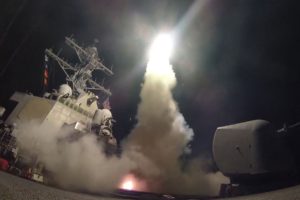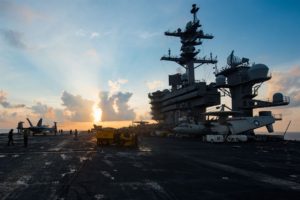Trump’s Syria Attack Trampled Many Laws

With 59 Tomahawk cruise missiles, each armed with over 1,000 pounds of explosives, Donald Trump went from scoundrel-in-chief to national hero, virtually overnight. The corporate media, the neoconservatives and most of Congress hailed Trump as strong and presidential for lobbing bombs into Syria, reportedly killing seven civilians and wounding nine.
“The instant elevation of Trump into a serious and respected war leader was palpable,” wrote Glenn Greenwald. This sends Trump a frightening message: bombing makes you popular.
Two wrongs don’t make a right. The use of chemical weapons is illegal, immoral and intolerable. If it was an intentional attack, it constitutes a war crime. Anyone responsible for the horrific April 4 events in the Syrian town of Khan Sheikhoun, which killed over 80 people, including at least 20 women and 30 children, should be brought to justice. But Trump’s bombing of Syria, a sovereign nation, was illegal, under both U.S. and international law.

Marine Corps Gen. Joe Dunford, chairman of the Joint Chiefs of Staff, meets with members of the coalition at a forward operating base near Qayyarah West, Iraq, April 4, 2017. (DoD Photo by Navy Petty Officer 2nd Class Dominique A. Pineiro)
Trump and the prevailing U.S. national discourse rushed to judgment about who was responsible for the chemical attack – the Syrian government. An investigation by the Organization for the Prohibition of Chemical Weapons (OPCW), the implementing body for the Chemical Weapons Convention, was ongoing when Trump launched his missiles into Syria two days after the incident. The OPCW’s Fact-Finding Mission was already “in the process of gathering and analysing information from all available sources.”
As former U.N. weapons inspector Scott Ritter pointed out,
“chemical attacks had been occurring inside Syria on a regular basis . . . with some being attributed to the Syrian government (something the Syrian government vehemently denies), and the majority being attributed to the anti-regime fighters, in particular those affiliated with Al Nusra Front, an Al Qaeda affiliate.”
The Assad government has denied responsibility for the Khan Sheikhoun chemical attack, and some U.S. experts are also skeptical of the Trump administration’s supposed certainty that the Syrian military was responsible.
Philip Giraldi, former CIA officer and director of the Council for the National Interest, stated on the Scott Horton show that “military and intelligence personnel” in the Middle East, who are “intimately familiar” with the intelligence, call the allegation that Assad or Russia carried out the attack a “sham.”
Giraldi said the intelligence confirms the Russian account,
“which is that they [attacking aircraft] hit a warehouse where al-Qaeda rebels were storing chemicals of their own and it basically caused an explosion that resulted in the casualties.” Moreover, Giraldi noted, “Assad had no motive for doing this.”
Journalist Robert Parry concurs:
“Assad’s military had gained a decisive advantage over the rebels and he had just scored a major diplomatic victory with the Trump administration’s announcement that the U.S. was no longer seeking ‘regime change’ in Syria. The savvy Assad would know that a chemical weapon attack now would likely result in U.S. retaliation and jeopardize the gains that his military had achieved with Russian and Iranian help.”
Regardless of who is responsible for the Khan Sheikhoun chemical deaths, however, Trump’s response violated both U.S. and international law.
Trump’s Missile Attack Was Illegal
Two days after Trump’s bombing occurred, the President sent a letter to congressional leaders informing them of his attack on Syria. The War Powers Resolution, passed in the wake of the Vietnam War, requires that the President report to Congress within 60 days of initiating the use of military force.

The guided-missile destroyer USS Porter conducts strike operations while in the Mediterranean Sea, April 7, 2017. (Navy photo by Petty Officer 3rd Class Ford Williams)
The resolution, however, allows the President to introduce U.S. Armed Forces into hostilities or imminent hostilities in only three situations: First, after Congress has declared war, which has not happened in this case; second, in “a national emergency created by attack upon the United States, its territories or possessions, or its armed forces,” which has not occurred; third, when there is “specific statutory authorization,” which there is not.
The 2001 Authorization for the Use of Military Force (AUMF) authorized the President to use force only against those groups and countries that had supported the 9/11 attacks. The bombing in Syria was not authorized by any other act of Congress. Thus, Trump’s missile attack violated the War Powers Resolution.
Regarding international law, the United Nations Charter prohibits the “use of force against the territorial integrity or political independence of any state.” There are only two exceptions: when conducted in self-defense after an armed attack, or with the approval of the Security Council.
Syria had not attacked the United States or any other country before Trump ordered the missile strike. “The use of chemical weapons within Syria is not an armed attack on the United States,” said Notre Dame law professor Mary Ellen O’Connell. And the Security Council had not approved Trump’s attack. It therefore violated the Charter. In fact, under the U.N. Charter, Syrian President Bashar al-Assad would have a valid self-defense claim since the U.S. initiated an armed attack on Syria.
So, Trump committed an illegal act of aggression against Syria when he lobbed his missiles. According to U.N. General Assembly Resolution 3314, an “act of aggression” is the use of armed force by a state against the sovereignty, territorial integrity, or political independence of another state, or in any other manner inconsistent with the Charter. As stated above, Trump’s attack constituted an unlawful use of force under the Charter.
Moreover, treaties the United States has ratified, including the Charter, are part of domestic U.S. law under the Supremacy Clause of the Constitution. That means a violation of the Charter also violates U.S. law.

Marines fast-rope out of an SH-60 Seahawk during an exercise on the USS Bataan at sea, March 29, 2017. The Bataan is supporting maritime security operations and theater security cooperation efforts in the 5th Fleet area of operation. (Marine Corps photo by Cpl. Brianna Gaudi)
In his report to Congress, Trump wrote that he directed the attack to avert “a worsening of the region’s current humanitarian crisis.” So-called “humanitarian intervention” is not a settled norm of international law. As stated above, to be lawful, military force can only be conducted in self-defense or with the blessing of the Security Council. Neither was present in this case.
Trump’s humanitarian claim also does not pass the straight face test, in light of his Muslim Ban excluding all Syrian refugees from entry into the United States (halted by the courts, for now). Since the conflict in Syria began in 2011, more than 400,000 Syrians have been killed. Five million people are refugees. If Trump were indeed motivated by humanitarian concerns, Trump would embrace those seeking to escape the carnage in Syria, which he has emphatically not done.
The 1980 Refugee Act grants the President authority to determine how many refugees may be admitted to the United States. The President must consider whether “the admission of certain refugees in response to the emergency refugee situation is justified by grave humanitarian concerns or is otherwise in the national interest.”
When, during the presidential campaign, Trump said he wanted to ban all Syrian refugees from entering the U.S., he was asked if he could then “look children aged five, eight, ten, in the face and tell them they can’t go to school here.” Without skipping a beat, Trump replied,
“I can look in their faces and say, ‘You can’t come’. I’ll look them in the face.” Spoken like a true humanitarian.
Trump’s new-found humanitarian concerns, including his lament about the terrible fate of Khan Sheikhoun’s “small children and even beautiful little babies,” also stand in contrast to the horrific death toll from other U.S.-allied bombings in recent weeks. The U.S.-led coalition in Iraq and Syria killed nearly 1,000 non-combatants in March alone, “a record claim,” according to Airwars.org, a non-profit organization that monitors civilian casualties from airstrikes in the Middle East.
“These reported casualty levels are comparable with some of the worst periods of Russian activity in Syria,” the group said.
The coalition forces’ use of white phosphorous, a chemical weapon that burns to the bone, has been documented in Mosul, Iraq. And the U.S. Central Command confirmed that it has used depleted uranium, arguably a war crime, against ISIS in Syria.
Encouraging Trump to Use Military Force
Trump is obsessed with being liked. So, smarting from the healthcare loss and attacked by the media, the GOP’s right-wing and Democrats, Trump turned the tables. Now that he’s become Bomber-in-Chief, Trump is liked by nearly everybody – or so it seems. And what lesson will he learn from his missile attack? That being a strong, forceful leader makes people like you. And blowing things up makes you a “strong, forceful leader.”
Members of the Trump administration are sending mixed signals about whether they seek to forcibly change the Assad regime in Syria. That would violate the International Covenant on Civil and Political Rights, which the United States has also ratified.
During the U.N. Security Council meeting following Trump’s missile attack, the ambassador from Bolivia declared,
“The United States has not only unilaterally attacked . . . [it] has become that investigator, has become the prosecutor, has become the judge, has become the jury. Whereas the investigation would have allowed us to establish in an objective manner who is responsible for the attacks, this is an extreme violation of international law.”

Marine Corps Cpl. Justin Morrall prepares for night stalking during Korea Marine Exercise Program 17-6 near Camp Mujuk, Pohang, South Korea, March 30, 2017. (Marine Corps photo by Sgt. Ally Beiswanger)
Trump’s missile attack also has put a dangerous strain on U.S. relations with nuclear-armed Russia, which supports the Assad regime in the conflict with various opposition groups, including Al Qaeda’s affiliate and its spinoff, Islamic State or ISIS.
Following the April 6 missile strike, Russia suspended a memorandum of understanding designed to minimize collisions between U.S. and Russian aircraft over Syrian airspace. A statement issued by Russia, Iran and Assad’s forces said,
“What America waged in an aggression on Syria is a crossing of red lines. From now on we will respond with force to any aggressor or any breach of red lines from whoever it is and America knows our ability to respond well.”
With his missile attack, Trump has made the world a much more dangerous place.
“Make no mistake,” Norman Solomon wrote. “With 90 percent of the world’s nuclear weapons at the ready in the United States and Russia, pushing to heighten tensions between the two countries is playing with thermonuclear fire.”
Where Will Trump Bomb Next?
Meanwhile, Trump is taking provocative measures against nuclear-armed North Korea, deploying an aircraft carrier and several warships to the Korean Peninsula. Trump’s show of force is a response to North Korea’s recent ballistic missile test.

The aircraft carrier USS Carl Vinson travels in the South China Sea, April 8, 2017. (Navy photo by Petty Officer 3rd Class Matt Brown)
The Trump administration has indicated it may use pre-emptive strikes to prevent North Korea from developing a missile that could carry a nuclear warhead to the United States. Pre-emptive strikes violate the U.N. Charter, which specifies several non-forceful measures, including diplomacy, to maintain or restore international peace and security. But diplomacy doesn’t seem to be in Trump’s toolkit.
North Korea warned of “catastrophic consequences of [the United States’] outrageous actions.” Pyongyang said,
“We will take the toughest counteraction against the provocateurs in order to defend ourselves by powerful force of arms.” A foreign ministry spokesman said North Korea “is ready to react to any mode of war desired by the US.”
When Secretary of State Rex Tillerson appeared on ABC’s “This Week,” he cited the U.S. strike on Syria as a not-so-veiled warning to North Korea:
“The message that any nation can take is if you violate international norms, if you violate international agreements, if you fail to live up to commitments, if you become a threat to others, at some point, a response is likely to be undertaken.”
By logical extension, Trump’s missile attack on Syria makes the United States vulnerable to retaliation from other countries that see the U.S. violating international law and committing acts of aggression.
What can be done to stop the Trump administration’s illegal use of military force in Syria and its dangerous provocation of Russia and North Korea?
Medea Benjamin, co-founder of CodePink, suggests doing things that will be “positive for the Syrian people.” She advocates immediately lifting the ban on Syrian refugees, providing the U.N. with its requested $5 billion to deal with the humanitarian crisis, and demanding that the Trump administration work with Russia toward a ceasefire and a political solution.
Marjorie Cohn is professor emerita at Thomas Jefferson School of Law, former president of the National Lawyers Guild, and a member of the advisory board of Veterans for Peace. Her most recent book is Drones and Targeted Killing: Legal, Moral, and Geopolitical Issues. Visit her website at http://marjoriecohn.com/ and follow her on Twitter at https://twitter.com/marjoriecohn.

